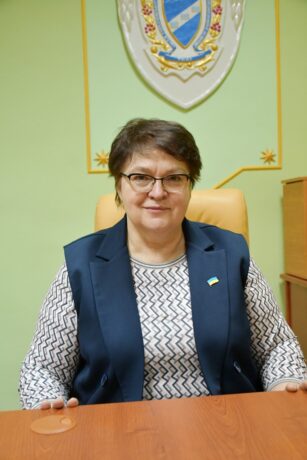Iryna Mykychak: “Ukraine is Undergoing a Global Transformation in Mental Health Preservation”
This week, as part of her working visit to Ternopil Oblast, Iryna Mykychak, Advisor to the Prime Minister of Ukraine and Director of Project Development at the Coordination Center for Mental Health under the Cabinet of Ministers of Ukraine, visited I. Horbachevsky Ternopil National Medical University.
She familiarized herself with the work of TNMU’s Mental Health Center. She discussed its involvement in building a mental health preservation system and the prospects for new joint projects with the university leadership.
In an interview, she elaborated on the transformation of the mental health sector.

How relevant is the issue of preserving Ukrainians’ mental health today?
In truth, the issue of mental health preservation has always been relevant. We cannot say that people did not need to care for their mental health in the past. However, we lived, grew, and learned during times when the concept of strengthening mental health and the culture of mental well-being did not exist in our country. There was psychiatric care provided in closed hospital settings that were misunderstood by the public, lacked respect for individuals and their rights, and created a fear of psychiatrists and psychiatric institutions. This led to a stigma surrounding psychiatry within society.
When Ukraine gained independence, there was not enough time or resources to address the issue of mental health preservation, and psychiatric hospitals remained marginalized within the healthcare system, struggling on their own to overcome the legacy of post-Soviet “punitive psychiatry.” The situation worsened during the COVID-19 pandemic. Unfortunately, beyond affecting the respiratory system, cardiovascular system, and other organs, COVID-19 has had a severe impact on many people’s mental health. Significant pressure on citizens’ mental well-being arose from quarantine restrictions, as people were forced to stay home and isolate themselves from usual social interactions, exacerbating depression and panic disorders.
Ukrainian society has been under stress since 2014 during the creeping hybrid war. In 2022, Ukrainians entered a period of total stress and crisis due to full-scale Russian aggression. Many people lost loved ones, friends, acquaintances, property, homes, jobs, and, ultimately, their homeland. All of this heavily impacted people’s mental health.
Against this backdrop of cumulative factors, there arose an urgent need to address mental health issues.
We must acknowledge First Lady Olena Zelenska’s courage and initiative in launching the mental health program “How Are You?” She became the voice advocating for preserving mental health among Ukrainian citizens and a leader in lobbying government structures to transform this sector.
I want to emphasize that, starting in 2022, we are experiencing a significant transformation in the mental health field. It is also crucial that the First Lady, by uniting Ukrainian society, government bodies, the non-governmental sector, and professionals, highlight Ukraine’s needs on all possible international platforms. This includes addressing the consequences of the war and advocating for necessary support, including joint efforts to preserve mental health.
In the media, we can find various statistics on how many Ukrainians need psychological support. What is the actual number of people requiring psychological assistance today?
When discussing challenges related to mental health, the war is the primary and most dramatic factor. According to studies conducted by Ukrainian and international organizations between 2022 and 2024, nearly 80% of Ukrainians are in constant stress. Various studies show similar results within statistical margins of error, indicating that at least 46% of people need assistance due to certain mental health disorders.
In 2022, we conducted an audit of mental health needs and resources, revealing that 80% of people requiring psychosocial support do not receive it, primarily because they do not seek help from specialists. Therefore, building this system is an urgent and critical task today.
Thanks to the First Lady’s initiative, the issue of mental health has become a key government priority, not just for the Ministry of Health but also for the Ministries of Education and Science, Social Policy, Culture, Veterans’ Affairs, Defense, Economy, and Justice. Currently, 11 ministries have prioritized mental health projects within their sectoral policies. For instance, ministries and regional military administrations now have deputy leaders overseeing the national mental health program “How Are You?”
Under this program, extensive informational campaigns are being conducted—at least 15 waves so far—to foster a societal dialogue about the importance of individual needs and normalize the idea that “not being okay” is normal. People are encouraged to care for themselves and learn self-help techniques to manage stress, mental disorders, and panic attacks effectively.
Community-based informal services are essential. These include Resilience Centers, spaces designed to help individuals address their mental health issues. Informal services also involve support from social workers, veteran care specialists in communities trained school teachers who can identify problems early, and assistance from clergy and religious institutions. Libraries, for example, can become spaces for psychological relief after staff receive proper training. Resilience Centers, therefore, play a vital role in providing psychosocial support at the community level.
The next step is seeking professional help. The first specialist in this chain is the family doctor. Nearly all family doctors in Ukraine have undergone basic training in the WHO’s mhGAP program, which equips them with foundational mental health skills. This initiative arose when Ukraine faced significant mental health challenges that it could not address adequately and in time. International NGOs stepped in to help.
Today, thanks to WHO and over 20 other international organizations, more than 120,000 professionals—including family doctors, social workers, teachers, and school nurses—have completed mhGAP training, significantly expanding access to qualified support.
What tasks are currently a priority for you?
My primary focus, on behalf of the Coordination Center for Mental Health and the Cabinet of Ministers of Ukraine, is developing a network of Mental Health Centers. I am the curator of this area. It is crucial to expand the services these centers provide so that people in communities can access informal support and specialized psychiatric care. Identifying mental health issues is essential, but it is even more critical to provide timely and high-quality assistance to those in need.
Our primary goal for 2025 is to develop a network of mental health centers within communities. This involves establishing such centers in cluster and super-cluster hospitals, possibly involving general hospitals.
I want to emphasize that, despite the war, limited financial resources, and the healthcare sector is heavily reliant on funding from international donors such as the EU, the U.S., and other countries, the Ukrainian government has allocated targeted funding for mental health services through the National Health Service of Ukraine (NHSU). Starting this January, specialized psychiatric and psychosocial assistance services in mental health centers, including mobile teams, are being contracted.
This initiative allows individuals to receive outpatient psychiatric and psychosocial support in their communities, specifically at polyclinics within cluster hospitals. These centers will function as structural units of healthcare facilities, staffed with at least two psychiatrists, psychotherapists, psychologists, and social workers. They will provide a confidential, welcoming, and non-judgmental environment for psychiatric consultations. Additionally, the centers will offer group therapy sessions led by psychotherapists and psychologists to help restore emotional balance and prevent emotional burnout, particularly among healthcare workers.
The centers will also feature day-care units for patients who do not require hospitalization in psychiatric hospitals. Another critical service is deploying mobile multidisciplinary psychiatric teams led by psychiatrists. These teams will provide in-home psychiatric care for individuals with mental health disorders.
This approach enables people to receive assistance in comfortable, familiar surroundings, avoiding hospitalization in closed facilities. It allows individuals to continue working, remain socially integrated, and reduces the stigma associated with mental health care. This strategy fosters a more inclusive and supportive environment for people with mental health challenges.
How should collaboration between a psychologist, psychotherapist, and psychiatrist work?
These professionals must work collegially and as a team. In international practice, there is an established approach where psychiatrists are required to possess psychotherapy skills. Ukraine is making significant progressive strides in this direction. One major achievement is the recognition of psychotherapy as a discipline in Ukraine and the ongoing development of protocols for providing psychotherapeutic care.
While working at Ternopil National Medical University, we integrate mental health components into medical education curricula. Faculty members of medical universities have been trained under the mhGap program, and trainers from among the faculty have been prepared to teach the mhGap curriculum in psychiatry departments in partnership with family medicine departments. Although international projects support these initiatives now, they will eventually conclude. Therefore, we must ensure sustainable professional training based on evidence-based methods, from stress management to mhGap.
We are already revising the curricula for psychiatrists and psychotherapists and are working with international experts to develop protocols. Ukraine’s unique experiences have drawn interest from experts worldwide. Recently, “The Lancet,” a leading medical journal, formed a commission of 40 international specialists who analyzed Ukraine’s mental health system. Under the leadership of Professor Iryna Pinchuk, the commission concluded that Ukraine is on the right path and provided recommendations for further progress.
Additionally, during the review of Ukraine’s steps toward European integration, we will present our achievements and plans for overcoming challenges in terms of aligning our legislation and the development of mental health centers. Topics such as the deinstitutionalization of psychiatric hospitals, reducing stigma, suicide prevention strategies, and narcotics policy will all be addressed as components of Ukraine’s policy to uphold dignity and human rights.
Universities are playing a crucial role in this transformation. For instance, Ternopil National Medical University has established a mental health center, which, once it fulfills all legal requirements, will be eligible for a contract with the National Health Service of Ukraine (NHSU).
We are also modernizing psychiatric hospitals, with the personal oversight of the Minister of Health. The World Health Organization, the World Bank, UNICEF, USAID, and other international partners provide significant support.
The primary goal of our program and government policy is to foster a culture of mental health and resilience at both individual and collective levels in Ukraine. Every step toward preserving mental health is a step closer to our victory.
- Your efforts seem to reflect a significant transformation in the mental health sector.
As mentioned, this is a global sector transformation involving not only healthcare professionals. Another milestone was the recent “Law on the Mental Health System in Ukraine” adoption by the Verkhovna Rada. Previously, Ukraine only had the “Law on Psychiatric Care.” This new law tasks the Cabinet of Ministers with making necessary adjustments and sets certification standards for specialists.
Since thousands of people in Ukraine have completed various training programs, university courses, and workshops, clear criteria and regulations are needed to define who can provide mental health services, the scope of such services, their quality, and safety. A series of secondary legislation must be developed to address the operation of the National Mental Health Commission and other nuances.
Ukraine is one of the first countries in Europe to adopt such a comprehensive mental health law, aligning our legal framework with EU recommendations.
· What is the uniqueness of Ukraine’s experience?
Mental health issues exist in many countries, and many of these countries also face a shortage of specialists. Our uniqueness lies in the fact that a country at war, defending its territory and people, with a large number of internally displaced persons and citizens with combat experience, is undergoing a global transformation. In other words, we are building a new, modern, progressive system. No other country has such an experience. Many specialists from different countries come to us to study our experience. Many ask how Ukrainians endure all of this: not sleeping all night due to shelling and then getting up in the morning to go to work. No one understands this. It is part of our genetic code. If we look at Ukraine’s history, we see that Ukrainians have always been in turbulent zones. We have gone through many difficult trials—wars, repressions, the Holodomor, the Chornobyl disaster, Russian aggression since 2014, and the full-scale war since 2022. Consequently, researchers from different countries are highly interested in studying and scientifically processing this experience. This direction is essential. It also concerns the academic community. There is a need for universities to lead the process of scientific research. Our principle remains unchanged, as it is in the country’s overall international policy: “Nothing about Ukraine without Ukraine.” Therefore, all research on our experience should exclusively be conducted in collaboration with Ukrainian scientists.

· How else can universities contribute to the development of the mental health system?
The involvement of universities in developing the mental health system is very important. During a meeting between the rectors of medical universities, the Minister of Health, and our Coordination Center, all heads of higher education institutions underwent an express training in mhGap. It was a bit unusual for them at first, but by the end, they were fully engaged in the learning process and expressed their enthusiasm. I want to mention that universities have never taught communication—horizontal, vertical, with patients, or among colleagues. A critical part of mhGap is mastering communication skills. Today, it is crucial to know how to communicate with veterans. Communication must be conducted with respect and dignity towards people with combat experience. There is a significant need for various high-quality training programs in universities, including undergraduate training with a component on mental health, communication, and continuous psychological development. But everything must be done with heart because it should serve the people of Ukraine. Universities are also important in conducting outreach work among the population so people can obtain reliable information and knowledge. If students learn and practice methods for preserving mental health during their studies, they can use and share these methods in their professional careers. This is particularly important for healthcare workers, who are most affected by burnout syndrome. Today, psychologists are also included in this group due to their heavy workload. Universities must become leaders in their regions regarding the preservation of mental health so that a professional and expert community forms around them.
